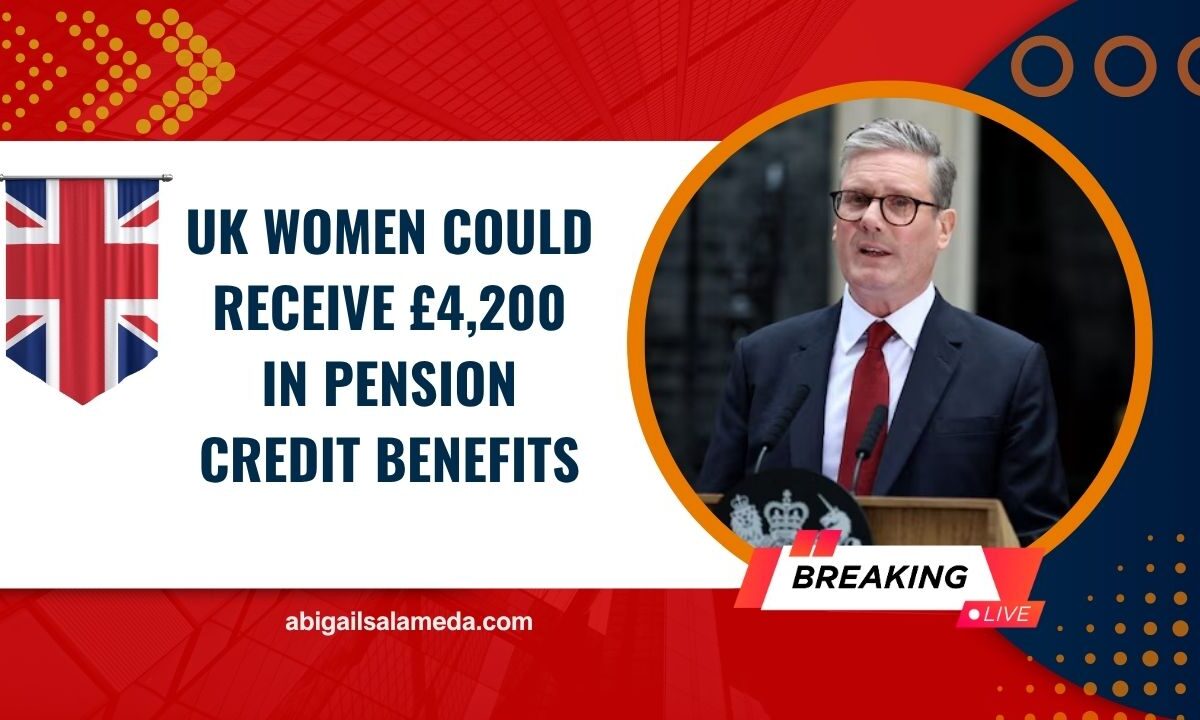A special support package from the UK government could deliver up to £4,200 a year to hundreds of thousands of retired women, particularly those born in the 1950s.
This assistance is not a one-off payment but a combination of benefits unlocked by qualifying for Pension Credit—a key income-boosting scheme for low-income pensioners.
Many women impacted by the WASPI campaign (Women Against State Pension Inequality), who faced unexpected increases in their pension age from 60 to 66, are particularly urged to check if they qualify for this significant financial help.
What Is the £4,200 Pension Credit Boost?
The £4,200 figure represents the total value of benefits and savings made available to those who are eligible for Pension Credit.
Even receiving just £1 a week in Pension Credit can unlock access to additional support programs such as energy discounts, free medical services, and council tax relief.
This support can make a major difference in the lives of elderly women living on fixed or limited incomes.
Overview of the Pension Credit Boost
| Topic | Details |
|---|---|
| Total Value | Up to £4,200 annually |
| Primary Beneficiaries | Women born in the 1950s, low-income pensioners |
| Age Requirement | Must be 66 or older |
| Application Methods | Online, Phone, or Post |
| Included Benefits | Bill assistance, council tax cuts, healthcare support |
Eligibility Criteria for Pension Credit
While the support focuses on older women, any low-income individual over State Pension age may qualify. You must meet the following criteria:
- Live in the UK
- Be aged 66 or older
- Have low weekly income:
- Under £220 if single
- Under £320 if in a couple
- Savings above £10,000 may be assessed, but do not automatically disqualify you
What Other Benefits Are Included?
Once you qualify for Pension Credit, you’re eligible for a range of additional financial support schemes. Here’s what you could receive:
| Benefit | Value/Support |
|---|---|
| Pension Credit Top-Up | Income boost based on individual need |
| Free TV Licence (75+) | Worth £159/year |
| Winter Fuel Payment | Between £250–£600 annually |
| Cold Weather Payments | £25/week during freezing weather |
| Council Tax Reduction | Up to 100% off annual council tax |
| Free NHS Dental & Prescriptions | Full coverage for eligible claimants |
| Warm Home Discount | £150 energy bill discount during winter |
Together, these benefits can add up to or exceed £4,200 per year, offering significant relief to women struggling with daily living costs.
How to Apply for Pension Credit
Applying is free, simple, and available in multiple formats. Here’s how to get started:
| Application Method | Details |
|---|---|
| Online | Use the official GOV.UK website |
| By Phone | Call the Pension Credit Claim Line at 0800 99 1234 |
| By Post | Request a paper form from the DWP |
You will need the following documents:
- National Insurance number
- Bank account information
- Proof of income, housing costs, and savings
- Option to backdate your claim by up to 3 months, if eligible
Why You Should Act Now
The Department for Work and Pensions (DWP) estimates that over 750,000 people are eligible but haven’t applied. Don’t miss out—this could change your financial future in retirement.
Whether you’re applying for the first time or think you might now qualify due to changes in income or circumstance, checking your eligibility now is a smart financial move.
The £4,200 Pension Credit Boost is a vital support opportunity, especially for older women still managing the financial impact of delayed retirement. With money-saving benefits ranging from energy bill relief to free healthcare, it’s an essential lifeline in today’s high-cost climate.
Don’t delay—check your eligibility and apply today to secure the benefits you rightfully deserve.
FAQs
Who qualifies for the Pension Credit boost?
UK residents over 66 with low income may qualify—especially women born in the 1950s affected by pension age changes.
Is the £4,200 a one-time lump sum?
No, it’s an annual value of various ongoing benefits and discounts available through Pension Credit.
Can I apply if I have savings?
Yes, savings over £10,000 are assessed, but they don’t automatically exclude you from eligibility.




